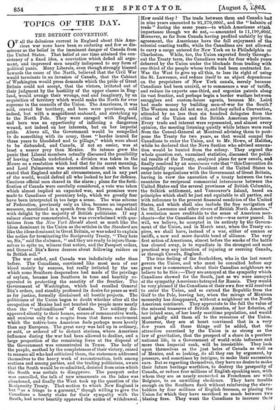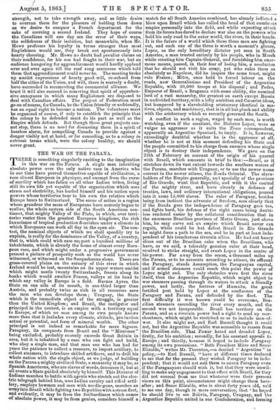TOPICS OF THE DAY.
THE DETROIT CONVENTION.
OF all the delusions current in England about this Ame- rican war none have been so enduring and few so dis- astrous as the belief in the imminent danger of Canada from the United States. That belief at one time attained the con- sistency of a fixed idea, a conviction which defied all argu- ment, and impressed men usually indisposed to any form of political panic. Many Liberals, even though strongly biassed towards the cause of the North, believed that the Civil War would terminate in an invasion of Canada, that the Cabinet of Washington would press demands which the pride of Great Britain could not accept, that the victors, irritated out of their judgment by the hostility of the upper classes in Eng- land, would avenge their wrongs, real and imaginary, by an acquisition of territory which would make the North for ever supreme in the councils of the Union. The Americans, it was said, craved for territory, and here were provinces, cold indeed, but with a magnificent seaboard, and stretching up to the North Pole. They were enraged with England, and here was an opportunity of inflicting a dangerous wound, not indeed on her interests, but on her imperial pride. Above all, the Government would be compelled to do something with its army, those " hordes inured for three years to bloodshed and to pillage," which were about to be disbanded, and Canada, if not an easier, was at least a nearer prey than Mexico. So intense grew the panic that Liberal members actually discussed the possibility of leaving Canada undefended, a division was taken in the House on a resolution which had that for its secret meaning, and Lord Palmerston was accounted almost rash when he stated that England under all circumstances, and in any part of the world, would defend all who looked to her for defence. Cautious official men shared in the alarm ; plans for the forti- fication of Canada were carefully considered, a vote was taken which almost implied an expected war, and promises were
made to Canadians of pecuniary help, which we greatly fear have been interpreted in too large a sense. The wise scheme
of Federation, previously only an idea, became an important measure, mentioned in a speech from the Throne, and hailed with delight by the majority of British politicians. If any calmer observer remonstrated, he was overwhelmed with quo- tations from the New York. Herald about as much like the ideas dominant in the Union as the articles in the Standard are like the ideas dominant in Great Britain, or was asked to explain the notice for terminating the Reciprocity Treaty, " They hate us, Sir," said the clubmen, " and they are ready to injure them- selves to spite us, witness that notice, and the Passport orders, and General Dix's fierce deorees about following raiders on to British soil."
The war ended, and Canada was indefinitely safer than
before. The Canadians, convinced like most men of our blood mainly by success, but really irritated by the use which some Southern desperadoes had made of the privilege of asylum, became less Southern in tone and heartily co- operated in protecting the sanctity of the frontier. The Government of Washington, which had recalled General Dix's orders, and steadily professed its desire for peace as well as for justice, formally disclaimed all hostile projects. The politicians of the Union began to doubt whether after all the occupation of Mexico had not touched the people more nearly than the " unfriendliness" of Canada. The soldiery dis- appeared silently to their homes, secure of remunerative work, and anxious only for a respite from that fierce excitement which the native-born American feels perhaps more keenly than any European. The great navy was laid up in ordinary, or sold, or ordered off to distant stations, where American influence during the war had been allowed to decline, and a large proportion of the remaining force at the disposal of the Government was concentrated in Texas. The body of the people, soothed by the completeness of their victory, ceased to menace all who had criticized them, the statesmen addressed themselves to the heavy work of reconstruction, both among sections and among parties, and the trading politicians, aware that the South would be re-admitted, desisted from cries which the South was certain to disapprove. The passport order was cancelled, the talk of new armaments on the lakes was abandoned, and finally the West took up the question of the Reciprocity Treaty. That section to which New England is but "as a fringe to a garment," though willing to give the Canadians a hearty shake for their sympathy with the South, had never heartily approved the notice of withdrawal.
How could they ? The trade between them and Canadil had in nine years amounted to 91,270,0001., and the " balanbe of trade " during the same years—to which Americans attach importance though we do not, — amounted to 110 90,0007.. Moreover, so far from Canada having profited unfairly by the agreement, the Americans have the full enjoyment of the colonial coasting traffic, while the Canadians are not allowed_ to carry a cargo entered for New York on to Philadelphia or Charleston. While, too, the Union exported freely through- out the Treaty term, the Canadians were for four whole years debarred by the Union under the blockade from trading with one-third of the people whose traffic had been contracted for. Was the West to give up all this, to lose its right of using the St. Lawrence, and reduce itself to an abject dependence on the proprietors of New York canals, merely because Canadians had been uncivil, or to commence a war of tariffs, and reduce its exports one-third, and organize patrols along- its vast frontier, and perhaps begin a border warfare between smugglers and custom-house agents, because Mr. Laird had made money by building men-of-war for the South? The Western men did not see it, and they called a Convention, attended by no less than six hundred delegates from the cities of the Union and the British American provinces. Every trade and interest were represented, and almost every opinion, the meeting listening quietly while letters were read from the Consul-General at Montreal advising them to post- pone the Treaty for two years, as that would compel the Canadians to enter the Union, and to Mr. Howe, of Halifax, while he declared that the Nova Scotian who advised annexa- tion would be hunted from the colony. They argued the whole question out, examined statistics, discussed the politi- cal results of the Treaty, analyzed plans for new canals, and finally resolved by an unanimous vote that " this Convention de respectfully request the President of the United States to enter into negotiations with the Government of Great Britain, having in view the execution of a treaty between the two countries for reciprocal commercial intercourse between the United States and the several provinces of British Columbia, the Selkirk settlement, and Vancouver's Island, based on principles which shall be just and equitable to all parties, and with reference to the present financial condition of the United States, and which shall also include the free navigation of the St. Lawrence and other rivers of British North America." A resolution more creditable to the sense of American mer- chants—for the Canadians did not vote—was never passed. It. will, we believe, be accepted in its entirety by the Govern- ment of the Union, and in March next, when the Treaty ex- pires, we shall have, instead of a war, either of cannon or tariffs, a new and more durable bond of alliance. The very first action of Americans, almost before the smoke of the battle has cleared away, is to repudiate in the strongest and most practical way any intention of injuring or coercing Canada,. or through Canada, England.
The true feeling of the freeholders, who in the last resort govern the Union, and who must be consulted before any great war is commenced, about their Canadian neighbours we believe to be this :—They are annoyed at the sympathy which Canadians showed for the South, just as we were annoyed• at the sympathy Americans betrayed for Russia. They would be very pleased if the Canadians of their own free will resolved to enter the Union, and so extend the Republic from the Gulf to the Pole, leaving her, when the mirage of Mexican monarchy has disappeared, without a neighbour on the North American continent. They appreciate to the full the value of the mineral treasures of British America, of her fisheries, of her inland seas, of her hardy maritime population, and would most gladly add them all to the resources of the Union. Moreover, they are at heart convinced that in a very few years all these things will be added, that the attraction exercised by the Union is as strong as the law of gravitation, that the prospect of a share in a peerless national life, in a Government of world-wide influence and more than Imperial rank, will be irresistible. They look upon themselves as the just heirs of Canada as well as of Mexico, and so looking, do all they can by argument, by pressure, and sometimes by intrigue, to make their succession sure. But so regarding themselves, they have no desire to make their future heritage worthless, to destroy the prosperity of Canada, or reduce four millions of English-speaking men, with whom they are as nearly connected as Frenchmen are with Belgians, to an unwilling obedience. They have trouble enough on the Southern flank without reinforcing the slave- holders by four millions of English freemen, or placing the Union for which they have sacrificed so much between two blazing fires. They want the Canadians to increase their strength, not to take strength away, and as little desire to overrun them for the pleasure of holding them down as we desire to conquer a French department for the sake of coercing a second Ireland. They hope of course the Canadians will one day see the error of their ways, the selfishness of their isolation, but meanwhile, when Mr. Howe professes his loyalty in terms stronger than most Englishmen would use, they break out spontaneously into hearty cheering. Mr. Howe no doubt had peculiar claims on their confidence, for his son had fought in their war, but an audience hungering for aggrandizement would hardly applaud over and over again till the roof rang sentences which told them that aggrandizement could never be. The meeting broke up amidst expressions of hearty good• will, re-echoed from half the cities of the Union, and will, there is scarcely a doubt, have succeeded in recementing the commercial alliance. We trot it will also succeed in removing that spirit of apprehen- sive annoyance in which many Englishmen are disposed to deal with Canadian affairs. The project of Federation must go on of course, for Canada, be the Union friendly or unfriendly, has an equal right to become a nation. The volunteers must be organized of course, if only to establish the principle that the colony to be defended must do its part as well as the Empire which defends. But though those great projects can- not stop, there is no need for discussing them in a spirit of baseless alarm, for compelling Canada to provide against a danger visibly not at hand, or for conceding, as to a colony in extremis terms which, were the colony healthy, we should never grant.































 Previous page
Previous page